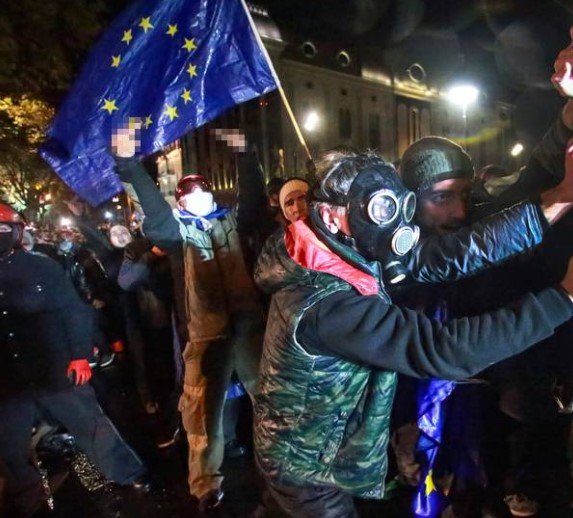Protests have erupted in Georgia, with thousands of citizens taking to the streets following the government’s decision to delay EU membership talks until 2028. Here’s a breakdown of the situation and what could happen next.
Tensions in Georgia have escalated dramatically over the past several days. Tens of thousands of protesters have clashed with riot police, demanding that the government uphold its commitment to European Union (EU) integration. The protests erupted after the Prime Minister, Irakli Kobakhidze, announced the suspension of EU accession talks until 2028. The decision came shortly after the European Parliament rejected the outcome of Georgia’s recent parliamentary elections, claiming irregularities.
What Sparked the Protests?
The catalyst for the protests was the Georgian government’s announcement to delay the EU talks. Prime Minister Kobakhidze made the decision shortly after the European Parliament criticized Georgia’s elections. The parliamentary body questioned the legitimacy of the October 26 elections, which were won by the ruling Georgian Dream party. Despite opposition claims of fraud and voter manipulation, the government dismissed these concerns, labeling the European criticism as an attempt to undermine Georgia’s sovereignty.

On the streets of Tbilisi, protesters are furious. Many feel betrayed by the government’s shift away from EU membership, which they see as essential for Georgia’s future economic stability and political reforms. “We want to join Europe,” one protester shouted, “not stay stuck in the past.” With many Georgians viewing EU accession as a path to a more democratic, prosperous future, the government’s abrupt change of course has angered a large portion of the population.
Why is EU Membership So Crucial for Georgians?
For many in Georgia, the European Union represents more than just economic cooperation; it symbolizes a commitment to democratic values, rule of law, and freedom of speech. Over the past several decades, Georgia has made significant strides in aligning itself with Western Europe, pushing for reforms in governance, trade, and human rights.
EU membership is seen as a major step in solidifying these gains. For years, Georgia has aspired to join the EU, not only for the economic benefits but also to strengthen its geopolitical position. With a long-standing history of tensions with Russia, many Georgians view closer ties with Europe as a safeguard against Russian influence in the region.
However, the ruling Georgian Dream party, which has had close ties with Russia in the past, has been increasingly reluctant to pursue deeper integration with Europe. Prime Minister Kobakhidze has stated that his government will focus on improving ties with the European Union but only on their own terms. He emphasized that Georgia would not bow to pressure from Brussels, despite his government’s stated goal of eventually joining the EU.
The European Union’s Response
The EU’s reaction to the postponement of talks has been one of disappointment. In a statement, European officials expressed their concern over Georgia’s democratic backslide. The European Parliament’s rejection of the October elections was a clear signal that Brussels is paying close attention to the political situation in Tbilisi.
While some EU leaders have called for more dialogue with Georgia, the tone has been firm: Georgia must demonstrate a stronger commitment to democratic reforms if it hopes to progress towards full EU membership. There are also fears that the current political crisis could strain Georgia’s relations with Europe even further, particularly at a time when Europe is focused on supporting Ukraine and countering Russian influence in the region.
Despite these tensions, European officials have indicated that they remain open to engaging with Georgia. However, the road to EU membership now appears to be longer and more uncertain than ever before.
What Happens Next?
As protests continue, the future of Georgia’s EU ambitions remains unclear. The government’s decision to delay EU talks has deeply divided the country, and while some political factions support the delay, many believe that the ruling party’s actions are motivated by personal and political interests rather than the broader good of the nation.
The government has vowed to maintain its course, despite the mounting pressure from both domestic protesters and international actors. However, the ongoing unrest may force the government to reconsider its position. In the coming days, the situation could evolve rapidly as protesters continue to demand accountability and action from their leaders.
The question on everyone’s mind is whether the protests will push the government to change its decision or whether this will mark a significant turning point in Georgia’s relationship with Europe. With EU membership hanging in the balance, the people of Georgia are making their voices heard—loudly.
